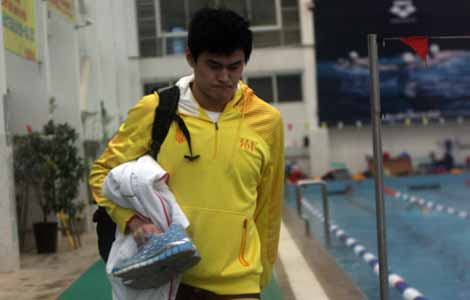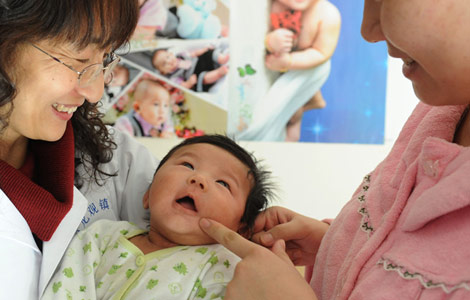Huge potential seen for preschool English in China
Updated: 2013-12-27 08:13
(China Daily)
|
||||||||
As more and more Chinese parents look for ways to give their kids a head start in school, a new market for preschool English instruction is emerging, and showing great growth potential, according to an education analyst.
"In recent years, parents (in China) have shown a growing awareness of the need to invest in children's training and education at an early age. They don't want their children to lose their competitiveness at the starting line," said Zhang Yang, an analyst with Huidian Research.
The next few years could be a golden age for the development of a preschool English instruction market in China, which is expected to grow at a rate of more than 20 percent, according to a Huidian report entitled In-depth Research and Development Forecast of China's Children English Training Market, 2013-2017.
The report finds an enormous potential consumer base for preschool English education services in China, where there are about 180 million children under the age of eight, with more than 20 million newborns annually, one out of three in urban areas.
An increase in average family income also contributes to the market's rosy outlook, according to Zhang. "With higher income, along with the growing awareness of the benefits of English education at an early age, we expect more resources to be allocated for preschool English education," she said.
"There is a great appetite in China to learn English and that applies to all ages really," said Brendan O'Grady, communications director at Pearson International. "There is a growing awareness among parents that English is a valuable skill for their children to learn — especially for the growing middle class, many of whom aspire to having their children study overseas or work for multinational corporations."
Currently Pearson — along with Disney and New Oriental — make up about 30 percent of the market for children's English training, Zhang said, explaining that the preschool market is still in an "exploratory stage" and immature, which means opportunities for growth.
"Thousands of schools have already entered the preschool market," Zhang said. "The barrier to entry is very low, so it is very easy to join the flow."
The emerging market is also unregulated, with no policies to help it develop, Zhang added. Many services leave customers unsatisfied.
Tao Dajiang regularly takes his three-year-old daughter to an English training school in Beijing, as the public kindergarten she attends does not offer English. Tao said he had a hard time choosing the right school for his child.
"I don't prefer foreign brands such as Disney, because for one thing, they're too expensive," he said. "For another thing, their system might not be suitable for the Chinese. Some classes are designed for native English speakers, not for Chinese kids."
Tao found that most domestic services simply used materials from foreign systems, which caused similar problems. Courses such as Lily English try to get children to think in English and immerse them in an English-speaking environment, but those children have to spend too much time in too many classes, he said.
As for the domestic programs that design their own materials, the quality varies greatly, which confuses parents even more, said Tao.
"I think there is a general consensus among parents born in the '80s to avoid exam-oriented education," Tao said. "But in terms of English education, we can't really tell which type of class is better."
"What I want is simply for my kid to enjoy learning English, have basic communication abilities and not be afraid of foreigners," Tao said.
Nini Suet, CEO of Shang Learning, a newly founded boutique education consultancy, has found that it does not necessarily take a very sophisticated product or a super strong teaching team to cater to the preschool English education market. That's why she chose to go after the adolescent market instead.
"The (preschool) market is very scattered," she said. "There are good ones, but oftentimes they just license from foreign content providers and find a place to teach. They don't need to develop their own products that are tailored to Chinese learners."
Suet said the low entry barrier makes it harder for a brand to stand out. By comparison, adolescents need a more comprehensive training to gain specific results, such as improving standardized test scores for admission to colleges in English speaking countries.
"We will expand to the market for smaller kids when we have done well enough in serving students aged 13 to 18," she said.
Zhang Yang contributed to this story and can be reached at yangzhang@chinadailyusa.com.

 LeBron James is AP's Male Athlete of the Year
LeBron James is AP's Male Athlete of the Year
 Year-end horse-ride parade California
Year-end horse-ride parade California
 Pick your new year sunrise
Pick your new year sunrise
 Memorial a big draw on Mao's birthday
Memorial a big draw on Mao's birthday
 China's urbanization rate to hit 60% by 2018
China's urbanization rate to hit 60% by 2018
 Oly champion resumes training after scandal
Oly champion resumes training after scandal
 Private clinics take on new role
Private clinics take on new role
 Obama thanks troops for service
Obama thanks troops for service
Most Viewed
Editor's Picks

|

|

|

|

|

|
Today's Top News
China reports 12th vaccine-related death
China begins e-commerce legislation
Li drops in to help realize home dream
Govt issues holiday warning
US judge upholds NSA surveillance program
War shrine visit fury mounts
China's vaccines are safe: WHO
Chinese students in US buy luxury
US Weekly

|

|






